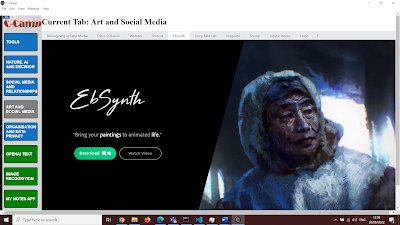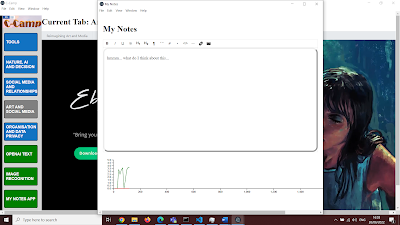I'm running a small EU project in July called C-Camp. The idea is to instil and explore computational practices among students from 4 European Universities (Prague, Copenhagen, Milan and Heidelberg). I wanted to create something for it which built on my experiences in Russia with the Global Scientific Dialogue course (Improvisation Blog: Transforming Education with Science and Creativity (dailyimprovisation.blogspot.com) - about which a paper is shortly to appear in Postdigital Science and Education).
In Russia, the vision was to present students with a technological "cabinet of curiosities" - a way of engaging them in asking "this is interesting - what do you make of it?". It was the uncertainty of encounter with technological things which was important - that was the driver for dialogue, which dominated the course. C-Camp is very much in the same spirit.
This time, I have been a bit more ambitious in making my cabinet of curiosities. I've made a cross-platform desktop app using ElectronJS which incorporates a tabbed web-browser, alongside self-contained tools which make available learner's data to the learners (and only to the learners). The advantage of a desktop tool is that, apart from the learners being able to change it (my programming and design is merely functional!), nothing personal goes online, apart from the traffic in each website. The data of engagement with the tools - which is something that is usually hidden from learners - then becomes inspectable by them. There are lots of "cool tools" that we suggest exploring (like the amazing EbSynth below)
The pedagogy of the course will then be to explore the data that learners themselves create as they process their own uncertainty. It's messy data - which can be an advantage educationally - but it illustrates a number of important principles about what is going on online, and what data big tech companies are harvesting, and how they are doing it. More to the point, by having a desktop tool, there is an important thing to say that "edTech doesn't have to be like the LMS!". Not everything needs to be online. Not everything needs to be harvested by corporations. And more to the point, if individuals were more in contact with their own data - particularly their own learning data - there are opportunities for deepening both our learning and our engagement with technology. So supporting students in downloading and analysing their own Facebook data can be part of a journey into demystifying technology and inspiring the imagination to look "beyond the screen"





